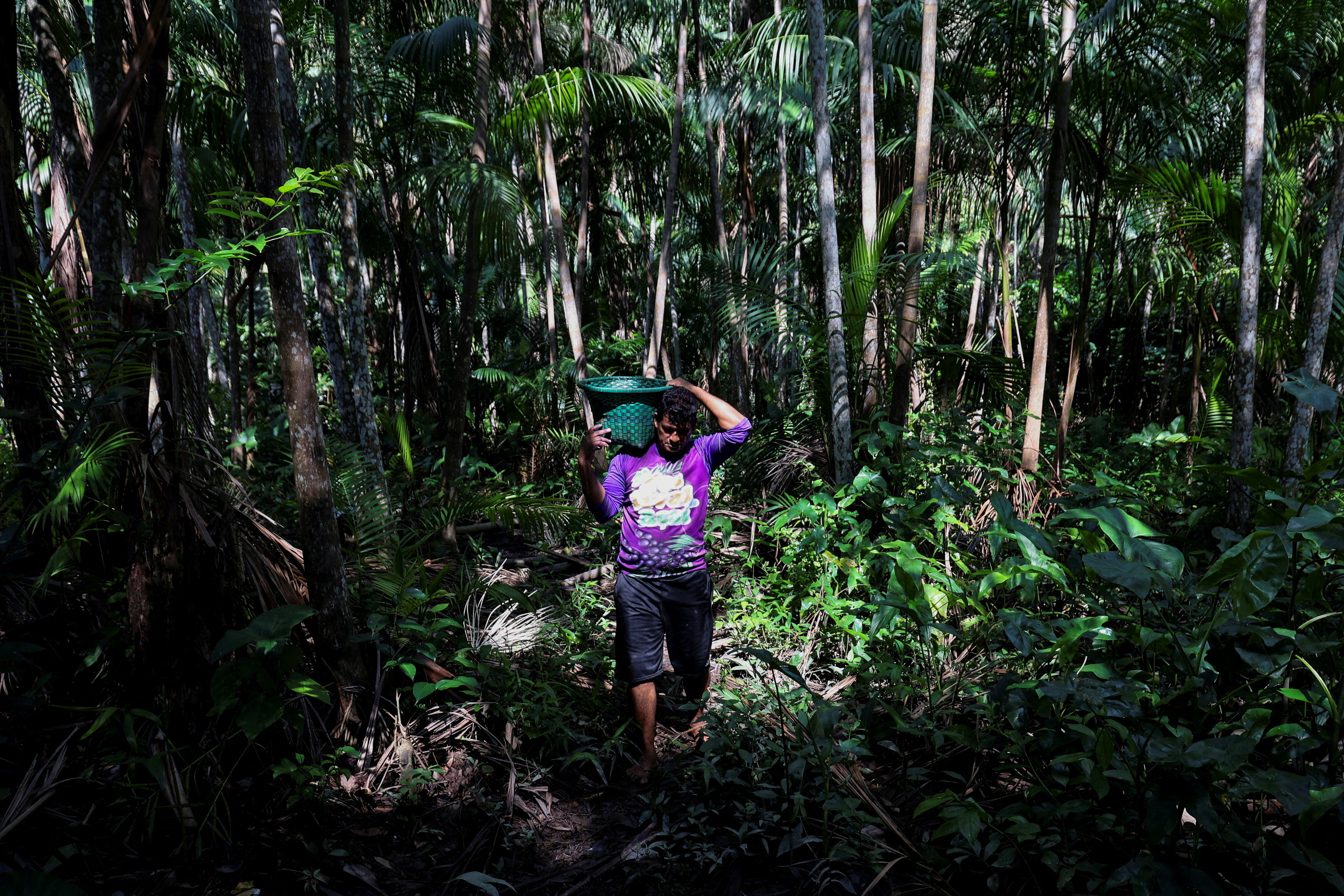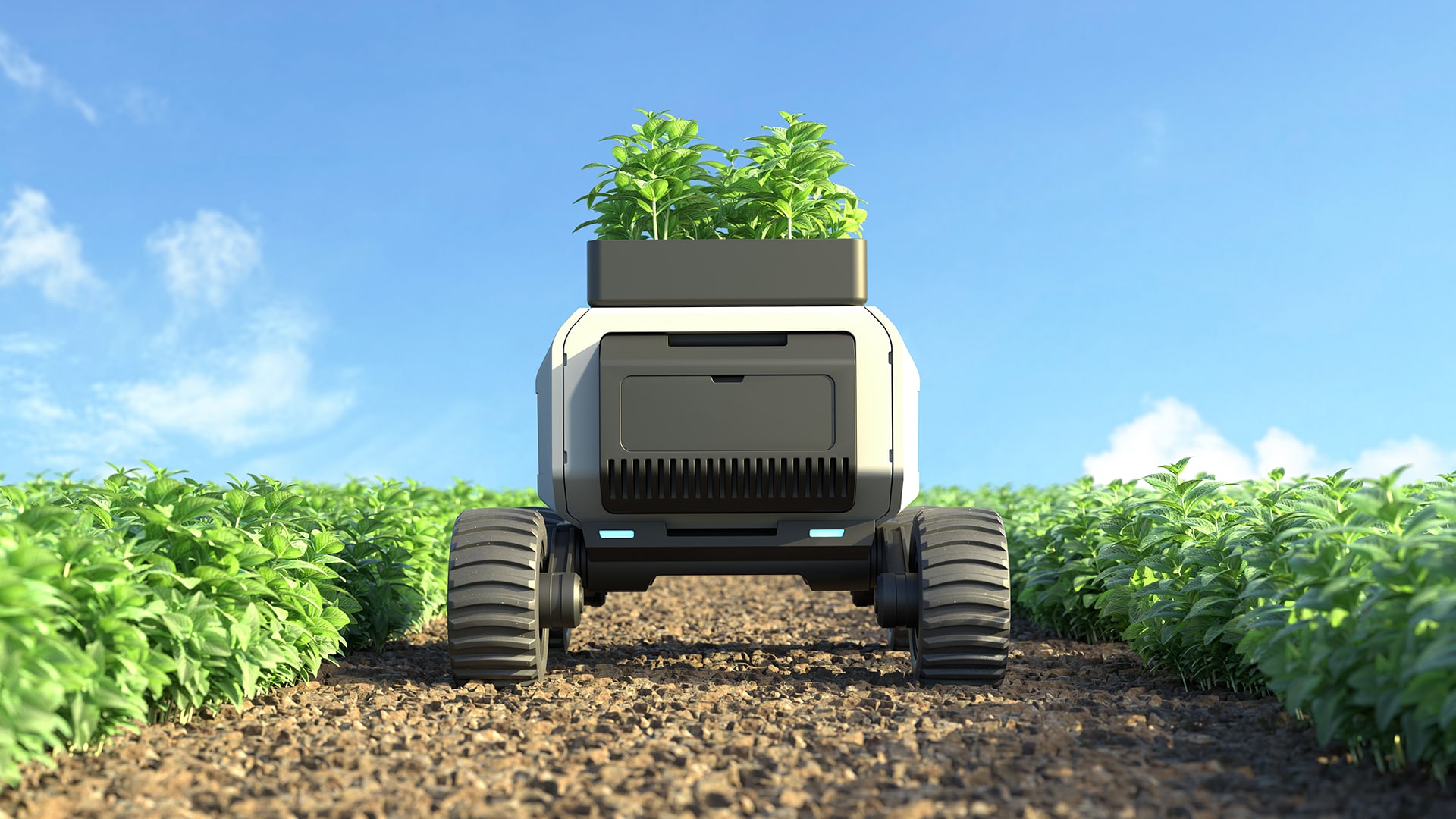Earth already has a perfect recycling system. So why not use it?

Could new, plant-based packaging reduce food waste along with our reliance on plastics? Image: REUTERS/Siphiwe Sibeko
We live at a crossroads, both for humankind and our planet. Will we find a way to walk a sustainable path, or will we stand outside the laws of nature, imperiling the planet and its people?
A car is speeding down the road towards that crossroads. The window rolls down, and out pops a plastic bottle. Looking on, most of us would call that litter. Many of us would wonder whether the bottle could have been recycled. Others might think of more dire consequences; perhaps the bottle washes down the road into a stream, and that stream washes it out to the river. Then it floats from river to ocean, the end of the natural line. There the bottle will remain, slowly grinding down into non-biodegradable bits that eventually enter the food system. Plankton, fish, mammals: from one bottle to billions, a global tragedy emerges that is fast becoming everyone’s problem.
Another car is rolling down the same road. The window opens, and the driver takes the last bite of a crisp apple before chucking it out onto the blacktop. Some of us might wonder whether it could have been thrown away in a proper bin, but most of us would see no tragedy. We know, even as children, that nature has the equipment to recycle the uneaten bits of that apple. After all, it was made of building blocks from time immemorial, born of a virtuous cycle of growth and decay.
What if our planet’s natural system of renewal held the secret to inventive solutions that enabled innovative growth and new potentialities that were part of nature, not apart from it? Apeel Sciences was born of that philosophy. Rather than use what nature has never seen before, and is therefore unknown to nature’s recycling system, we build solutions from plant-derived materials, imagining products that can be reused by nature millions of years from now.
Apeel works with ‘nature's alphabet’, the chemical building blocks of all living systems. These are the simple yet sophisticated molecular structures found in every bite of fruit we eat. These elegant chemical combinations are words and phrases made from that alphabet that have proven to be the most versatile and easy to handle for Earth’s recycling system. Yet too often when we speak of chemicals, we imagine only dangerous pesticides, toxic preservatives and pervasive plastics. But water itself is a chemical. The air we breathe is a combination of chemicals. Chemicals are, in fact, all around us. If we recombine those same building blocks of chemical elements - without creating a new alphabet - then the natural machinery exists in nature to reuse those bits. No recycling plant needed or catchment ponds required. Our natural world can break it down.
Imagine two molecules, opposite sides of the same coin: one of nature, one apart from it. Take the example of sucralose and rebaudioside A. While both serve as non-caloric sweeteners, one has been manipulated by man in ways unfamiliar to nature. In the case of chlorinated sugar, also known as sucralose, scientists created a calorie-free sweetener from sucrose. They cleverly invented a sweet substance our bodies wouldn’t process like sugar - with associated calories - by substituting the select hydroxides in sugar with chlorine. Just like that, we can fool our taste buds into tasting something sweet. But we can’t fool our bodies; our own natural processing systems. With sucralose, what we process as sweet in our mind, is not processed by our body as energy, as sugar would be. Nor can we fool microbes, which are slow to degrade sucralose in the environment, leading it to persist like a plastic bottle in the ocean.
In contrast to sucralose is Rebaudioside A, which comes from Stevia rebaudiana, the stevia plant. By some fluke of nature, though it is it is chemically quite different from sugar, stevia is sweet. Potently sweet. It’s sweet enough that it too is being used as a non-caloric sweetener. And yet, it is of nature. Its structure is not unknown to nature, so its machinery can break it down into its constituents with ease.
Like sucralose, a similar concept of chemical manipulation can be seen with neonicotinoid insecticides that are derived from nicotine, a natural pesticide that evolved in plants as a defense. Used in isolation, the plant-based chemical, nicotine, affects human nervous systems, giving users a buzz and even becoming addictive. Nicotine also binds to the nicotinic acetylcholine receptors in insects, leading to nicotine’s pesticidal properties. The challenge for scientists was to borrow nicotine’s pesticidal properties without causing residual nicotine effects in humans. So chemists changed its molecular makeup subtly and introduced a class of insecticides that today is the most popular in the world, despite recent bans in the European Union. Only now are we waking up to the fundamental implications of introducing unnatural chemical combinations into ecosystems where organisms lack the natural machinery to break them down. Neonicotinoids build up in the food system, with evidence that their accumulation affects the nervous and reproductive systems of insects, including bees. Recent research suggests these chemicals are a leading contributor to Colony Collapse Disorder that endangers global bee populations, and are negatively affecting other insects and even birds.
Through chemistry, you might say, you can fool some of the people all of the time, but not all people, all the time. You can trick your taste buds, and throw insects off their trail, but you cannot fool nature itself.
At Apeel Sciences we revere nature and science, combining the inherent brilliance of the natural world with human inventiveness. We believe the only thing that should be on your food is food, so we engineered our solutions from nature. Made from plants, Apeel adds a little extra ‘peel’ to the surface of fresh produce to naturally slow water loss and oxidation — the factors that cause spoilage. Using what’s found inside the fruit - the building blocks nature gives us - we remix elements to create invisible, tasteless solutions for fresh produce that extend shelf life by two to five times.
Today, Apeel fruits and vegetables help consumers and retailers alike to reduce food waste, while opening new markets to farmers that lack access to the cold chain. With Apeel, a mango farmer in Kenya can get produce to market without the cost of refrigeration, gaining added income and greatly reducing food waste associated with over-ripening on the farm. For big growers, Apeel means the difference between using air freight to ship asparagus, or the ability to use the cheaper and less carbon-intensive shipping method afforded by Apeel’s power to preserve produce over time. And at supermarkets, Apeel makes it possible to buy avocados that stay ripe longer, so less good food is thrown away in the end.
Looking around the world today, one could borrow another phrase: “It was the best of times, it was the worst of times…” We live in an era of great abundance with people living longer, healthier lives in much of the world, but the evidence is increasingly clear that we’re destroying our planet. We are all challenged to do better by Earth, while feeding the world's growing population.
Today, I want to propose that we can learn from the natural world to answer the needs of our times. We can try living within the laws of the natural world, rather than persist in trying to live outside them. Instead of using what nature has never seen before, let's use materials it can recognize. Nature knows what to do. So do we.
Don't miss any update on this topic
Create a free account and access your personalized content collection with our latest publications and analyses.
License and Republishing
World Economic Forum articles may be republished in accordance with the Creative Commons Attribution-NonCommercial-NoDerivatives 4.0 International Public License, and in accordance with our Terms of Use.
The views expressed in this article are those of the author alone and not the World Economic Forum.
Stay up to date:
Agriculture, Food and Beverage
Related topics:
Forum Stories newsletter
Bringing you weekly curated insights and analysis on the global issues that matter.







